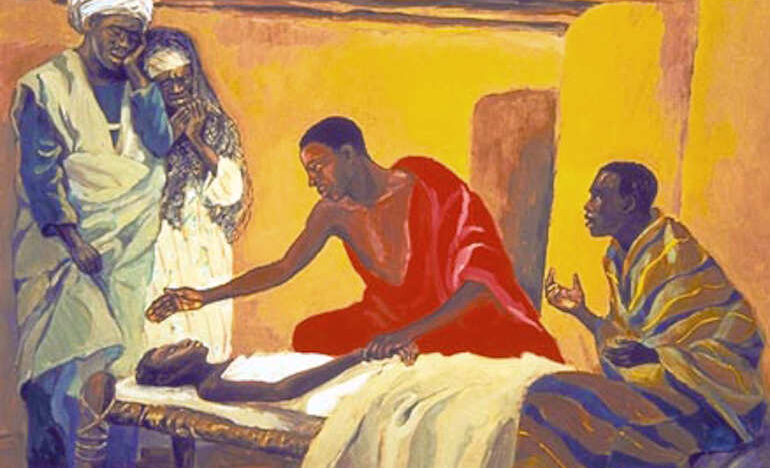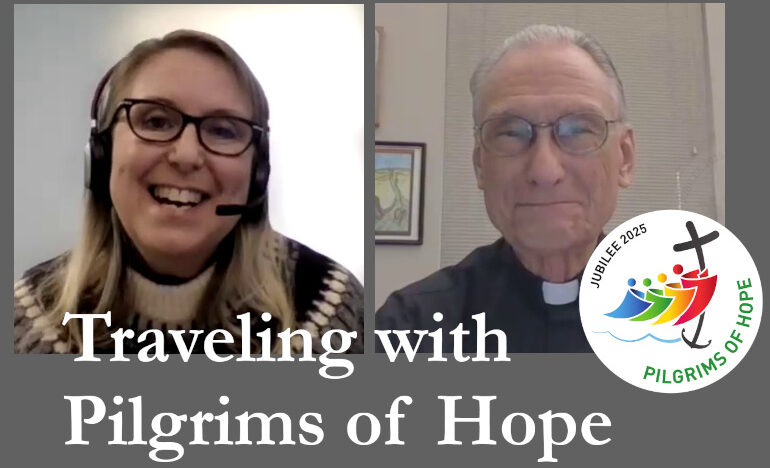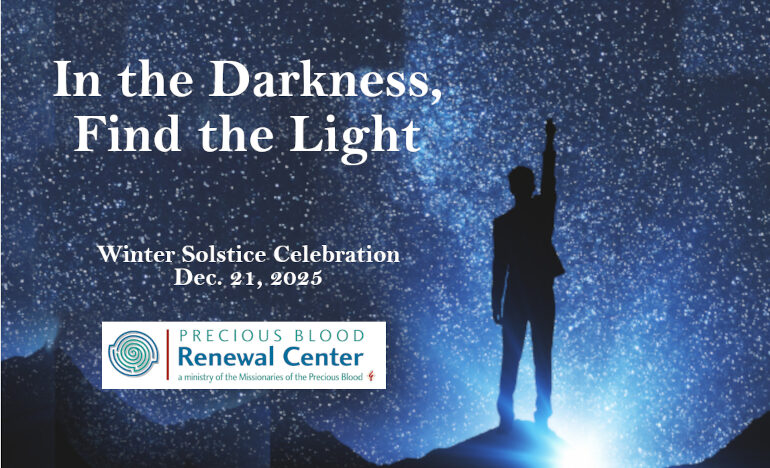The Gospel of Mark: The Vivid Details of an Eyewitness

By Fr. Ron Will
Part 2 of 4. All the articles are here.
Author’s Note: During the 2021 liturgical year, we are reading from the Gospel of Mark at Sunday services. Let’s take time to study together the Jesus whom Mark reveals. Read these articles and join our mini-retreat.
The “Son of God” has a rich, deep humanity in Gospel of Mark. The Greek word that Mark uses to describe Jesus’ reaction to the plight of the leper in 1:41 might be translated as “his heart melted with compassion,” the same word is used for Jesus’ compassion on the crowds. In the next chapter in Mark, when Jesus addresses the Pharisees (2:17), who accused him of disregarding their strict laws of ritual purity by dining with publicans and sinners, he said: “It is not the healthy who need a doctor, but the sick. I came not to call the just but sinners.” It is the Parable of the Lost Sheep all over again.
Fr. Ron’s mini-retreat with Mark’s Gospel will be on the evening of Feb. 9 and the morning of Feb. 13. Learn more and register here.
No other Gospel gives such a human picture of Jesus. Sometimes its picture is so human that the later writers modify it a little almost as if they are afraid to say what Mark said. To Mark Jesus is simply “the carpenter” (6:3). Matthew would alter that to “the carpenter’s son” (Matthew 13:55), as if to call Jesus a village tradesman is too daring.
No other Gospel writer tells us so much about the emotions of Jesus as Mark does:
- Jesus sighed deeply in his spirit (7:34; 8:12)
- He was moved with compassion (6:34)
- He marveled at their unbelief (6:6)
- He was moved with righteous anger (3:5; 8:33; 10:14).
Only Mark tells us that
- When Jesus looked at the rich young man, he loved him (10:21).
- Jesus felt the pangs of hunger (11:12).
- He grew tired and wanted to rest (6:31).
It is in Mark’s Gospel, above all, that we get a picture of a Jesus with passions like us. The sheer humanity of Jesus in Mark’s gospel brings him very near to us.
One of the great characteristics of Mark is that over and over again he inserts little vivid details into the narrative, which are the hallmark of an eyewitness.
For example, Mark quite often gives us the Aramaic words that Jesus used.
- To Jairus’ daughter, Jesus said, Talitha koum which means “little girl, arise!” (5:41).
- To the deaf man with the speech impediment he said, Ephphatha! “Be opened!” (7:34).
- In agony in the garden, he prays, Abba, “Father.” (14:36).
- From the cross, he cries out, Eloi, Eloi, lama sabachthani? “My God, my God, why have you forsaken me?” (15:34).
According to tradition, Mark was not an apostle, one of Jesus’ original disciples, but he was a disciple of Peter. Mark would have heard these stories of Jesus’ life and ministry from Peter himself. That could explain the details of Mark’s narrative.
In the retelling, Peter could hear again the very sound of Jesus’ voice and would have given Mark the very words Jesus spoke.
Those words that Mark captured speak to our lives today — to our present-day situations as individuals, as families, as Church.
As we continue to observe social distancing, I invite you to a mini-retreat on the Gospel of Mark by means of Zoom. I invite you to nourish your souls by studying together God’s sacred word.
Information about how to register for the Mini-Retreat is on the Renewal Center website now. Click on the following links to learn more. It will be offered on Tuesday, February 9, 6:30 to 8:30 p.m. central time and offered again on Saturday, February 13, 10 a.m. to noon central time.
Note: Never miss an article published on the Renewal Center website: Sign up to receive our newsletters
[Fr. Ron Will, a Precious Blood priest and spiritual director, is a graduate of Catholic Theological Union and Creighton University’s School of Christian Spirituality. He has a special interest in helping form intentional disciples of Jesus, encouraging others to go spiritually deep-sea diving to explore a deeper relationship with God, and walking with people as they dive into the ocean of God’s mystery actually experiencing God rather than simply dipping one’s toe into the water.]
“Healing of the Daughter of Jairus” by a Cameroonian artist part of the Life of Jesus Mafa project, from Art in the Christian Tradition, a project of the Vanderbilt Divinity Library, Nashville, TN. http://diglib.library.vanderbilt.edu/act-imagelink.pl?RC=56455 [retrieved January 18, 2021]. Original source: http://www.librairie-emmanuel.fr (contact page: https://www.librairie-emmanuel.fr/contact).
Related

Pilgrims of Hope, Episode 11 Walking with Young People
In this episode of the Jubilee Year video series, “Traveling with Pilgrims of Hope,” we talk with Teri Iverson, the Vocation Ministry Coordinator for the Sisters of the Precious Blood in Dayton, Ohio, about the joy and hope she finds in working among young people.

Video: Winter Solstice Celebration 2025
The Winter Solstice is the longest night of the year and the earth lies fallow. We are drawn naturally into contemplation. At the Renewal Center, we mark the Winter Solstice with a time of slow, quiet reflection and fellowship.
Categories
Assembling God's Puzzle Coffee with Padre Cooking & Spirituality Encounters of the 4th Kind Family Matters Guided Meditations Reflections on the Eucharsitic Prayers Spiritual Resources Taize Prayers Teach Us to Pray The Contemplative Life Traveling with Pilgrims of Hope Uncategorized Videos When you need a little help
